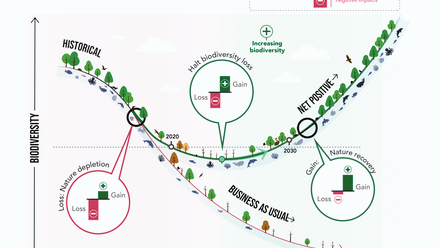UK has lost position on climate leadership, says government advisor
The UK's Climate Change Committee (CCC) said Britain is missing multiple climate change targets and had lost global leadership since COP26.
The committee raised concerns about whether, if progress continues to stall, the nation would meet its planned 68% reductions in carbon emissions by 2030. It also highlighted concerns over a lack of progress in adapting the planning system and retrofitting the country's housing stock.
The CCC's annual progress report to Parliament pointed out that the number of homes being insulated under the government's own Energy Company Obligation scheme had more than halved, dropping from 383,700 in 2021 to 159,600 in 2022, and 'continued to be below necessary levels' of 1m to 2m home upgrades per year.
The committee said the government had promised to install heat pumps on 600,000 buildings by 2028 but this was behind schedule too and 'technological solutions' had 'not been deployed at scale'.
The UK Green Building Council (UKGBC) Deputy Chief Executive Simon McWhirter described the report as a 'deeply troubling assessment'. He said: "With the UK's planning system blocking vital progress, efficiency installations falling last year despite 30 million buildings urgently needing energy upgrades, and the UK ranking dead-last in Europe for heat pump installations, this report shows how severely off-track we are from our path to a net zero future.
"Together with more than 100 UK businesses, we've called on the government to take the golden opportunity of using the Levelling Up and Regeneration Bill currently before Parliament to align the planning system with our climate and nature goals.
"And its Future Homes and Buildings Standard, due to be consulted on this summer, is the moment to show the necessary ambition to ensure all new buildings are genuinely fit for purpose – with very low energy demand and adapted to our heating climate."
The CCC, chaired by former environment secretary John Gummer, argued that UK leadership on climate change had become 'weaker' since COP26, held in Glasgow in 2021, and in the past 12 months, during which time Whitehall has published its Carbon Budget Delivery Plan (CBDP).
Gummer said: "It is critical that the UK re-establishes its climate leadership with a clearer strategy to develop net zero industries and technologies in the UK and capture the economic benefits of net zero."
He also said that, despite a 'very short' timeframe, it was still possible to have an impact with bolder policy now and set out recommendations to the government including:
- Ensure that planning frameworks and guidance across the UK support a clear presumption against new consents for coal production
- Consult on a full technical specification for the Future Buildings Standard and Future Homes Standard to ensure resilience to climate change impacts and Net Zero compliance
- Better regulations and standards for homes created through a material change of use
- Reform EPCs and publish plans to enhance compliance with Building Regulations and minimum EPC requirements
A government spokesperson said: "We can be proud of the UK’s record as a world-leader on net zero. We are going far beyond other countries and delivering tangible progress whilst bringing down energy bills with hundreds of pounds coming off bills from next month.
"The UK is cutting emissions faster than any other G7 country and attracted billions of investment into renewables, which now account for 40% of our electricity. In the last year alone, we have confirmed the first state backing of a nuclear project in over 30 years and invested billions to kickstart new industries like carbon capture and floating offshore wind.
"With a new department dedicated to delivering net zero and energy security, we are driving economic growth, creating jobs, bringing down energy bills, and reducing our dependence on imported fossil fuels."
This article first appeared on Architects' Journal





